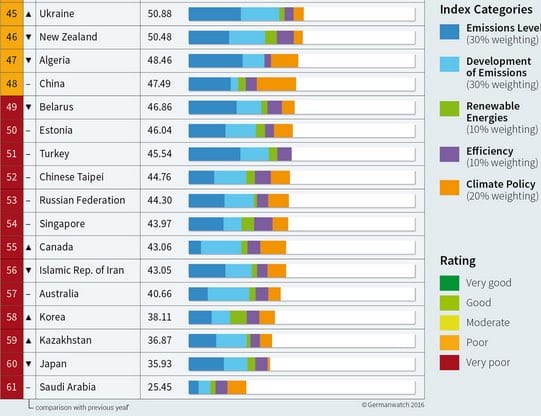Australia has once again found itself languishing at the bottom of the global rankings on climate policy and action, not budging from its 2016 position of fifth-last, in the latest Climate Change Performance Index, published overnight by the Climate Action Network Europe and German NGO Germanwatch.
As you can see in the table below, Australia comes in at number 57 – sandwiched in-between two developing nations, the Islamic Republic of Iran and Korea, in the “very poor” performance section – out of a group of 61 countries responsible for more than 90 per cent of global energy-related CO2 emissions.
As the accompanying report notes, this shows no change from last year, even if Australia did slightly better in the categories of emission development and renewable energy (it went backwards on energy efficiency).
The report comes as energy minister Josh Frydenberg attends the Bonn climate talks, and as Australia comes under pressure, not just from a UNEP report that found Australia trailing its own modest target for 2030 – but also to raise its ambition along with other countries before 2020
The report also notes that in the policy ranking, Australia climbed two places. But it is careful to qualify the “wide gap” that exists between the country’s state and federal policies: “while the former were rather unambitious and uninspired,” it said, “the latter managed to some extent to take independent action.”
Bravo the states. Still, it’s a very poor showing, and one that the Labor spokesman for climate and energy, Mark Butler, has seized upon.
“Australia has again been slammed for its disastrous and ineffective climate policy,” Butler said in a statement on Thursday.
“In what is now an annual occurrence, Australia has been ranked as one of the world’s worst performing nations when it comes to tackling climate change.
“Turnbull is incapable of standing up to the hard-right fossils of his party and implementing credible climate policy,” he continued.
“Not only will Turnbull fail our international obligations he is failing future generations of Australians.”
On the bright side, at least we are still doing better than Kazakhstan and Saudi Arabia.







